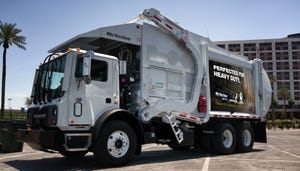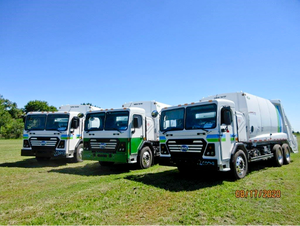New Lives for Old Electronics
Tech companies make it easier to recycle electronic waste.
April 1, 2008
Nancy Mann Jackson
Like Dogs, Electronics Age Much Faster than humans do. But while old dogs still make loyal companions, there's no reason to keep an outdated computer or television around the house. Many consumers, unsure of how to properly dispose of unwanted electronic equipment, simply throw the items in the trash.
Most e-waste still winds up in landfills, largely because recycling it is inconvenient for consumers, or they are uneducated about how and where to recycle it properly. “If we don't make [recycling of e-waste] convenient for the consumer, it's unlikely that we'll be successful,” says Matt Coz, vice president of business development for Recycle America, a subsidiary of Houston-based Waste Management (WM).
To confront the e-waste problem, several technology manufacturers have launched national recycling programs geared toward educating and motivating consumers to recycle their unwanted electronics. Manufacturers have discovered that recycling allows them to reclaim and reuse valuable resources. “Electronics are the fastest-growing waste stream in the industrialized world,” Coz says. “It makes sense for us to be invested in this because we're helping protect the environment from the hazardous materials contained in the electronics. [By recycling e-waste], we're doing the right thing from an economic perspective and an environmental perspective.”
“The recycling of computer equipment fuels economic activity, creates jobs and diverts potentially hazardous materials from landfills,” says Kate Krebs, executive director of the Washington-based National Recycling Coalition. “Today, hundreds of companies and organizations exist throughout the U.S. to process computer products for reuse and recycling. We believe that with a concerted national effort, America can reach a 100 percent goal of recycling and reuse of all discarded electronics.”
Here's what a few companies are doing to jumpstart the process:
Sony Electronics
“When you look at what it takes to make a product, there are a lot of raw materials and natural resources that go into it,” says Doug Smith, director of corporate environmental affairs for Sony. “Recycling is a way to take the parts of the old product and make a new product, and it's a lot more sustainable than to mine for new raw materials. It's far more energy efficient to reclaim copper, metal and plastic from electronic waste than to get them from natural ore.”
Last September, in an effort to reclaim more of those used materials, Sony partnered with WM Recycle America to launch the Sony Take Back Recycling Program. The national program allows consumers to recycle all Sony-branded products for free at 80 WM Recycle America eCycling drop-off centers throughout the United States. Other branded products also are accepted for nominal fees.
The program's goal was to open 150 sites within the first year, but Smith says the company is on track to surpass that milestone by September. In February, the program marked its 1,000th ton of recycled electronics. Ultimately, the company plans to open drop-off locations in all 50 states so there is a recycling center within 20 miles of 95 percent of the U.S. population.
To drive traffic to the existing drop-off centers, WM has staged e-waste recycling events, which are special days that are heavily publicized and have received media attention in various cities. The company is committed to staging 50 such events across the United States in 2008.
“We believe that you need to be responsible for what you produce, so we have some type of stewardship program for everything we produce, not just computers and TVs,” Smith says. “Educating and motivating the consumer continues to be the big challenge.”
Hewlett-Packard
Almost every Hewlett-Packard (HP) printer cartridge purchased by a consumer comes with a postage-paid, cartridge-size envelope to return the used product for recycling. This recycling program is just one of HP's e-waste initiatives. Launched in 1987, HP recycling programs now operate in more than 50 countries, regions and territories. In addition to the postage-paid envelopes for print cartridges, HP programs include:
Asset Recovery
This program provides enterprise, public sector and large commercial customers worldwide with cash or credit in exchange for qualifying used electronics equipment.
Trade-In
This program offers users the opportunity to capture the fair market value of aging technology and upgrade to new HP technology.
Donations
HP provides U.S. customers the opportunity to donate working computer hardware through the National Cristina Foundation and the Rethink Initiative with eBay.
Recycling
HP offers recycling of any brand of computer hardware and rechargeable batteries.
These programs seek to reduce the environmental impact of IT [information technology] products, minimize waste going to landfills, and help customers conveniently and responsibly manage products at their end of life,” says Renee St. Denis, director of HP's Americas Product Take Back program.
Starting in the early 1990s, HP began to design products with the environment in mind. Last July, HP reached its goal of recycling more than 1 billion pounds of electronics and print cartridges around the world.
Now, the company is accelerating its efforts with a goal of doubling its annual recovery rate to reach 2 billion pounds by the end of 2010. “This past year alone, HP recycled nearly 250 million pounds and reused more than 65 million pounds of products worldwide,” St. Denis says.
Dell
Dell has offered recycling services for business customers for more than a decade. In 2003, the company began offering consumer recycling, and in 2006, it committed to worldwide free consumer recycling. The program has been very successful: In 2006, Dell recovered about 78 million pounds of used equipment from customers, an increase of about 90 percent from the previous year, says Bryant Hilton, a Dell spokesman.
Currently, Dell is on track to meet its goal of recovering 250 million pounds of used computer equipment from customers by the end of 2009. Because the goal is continually evaluated, expanded and refined, the company reports its progress and its new goals annually in its “sustainability report.”
The Dell recycling program is unique because it offers free in-home pickup for consumers who want to recycle e-waste. “We will recycle any Dell-branded equipment for free at any time and recycle other brands for free with the purchase of new Dell equipment,” Hilton says. “A customer simply comes to our Web site, indicates what equipment they have for recycling, and they can print a shipping label. They pack the old equipment and we will pick it up from their home. All equipment is responsibly recycled by a Dell-authorized recycling partner.”
Dell's paid services for business customers work in much the same way, but include additional “value add” components, Hilton says. “We can help customers recover, refurbish and resell used equipment, returning 90 percent of the resulting proceeds to the customer,” he says. “And, we can come to the customer's site to pack the equipment and transport it to an authorized recycler. These customers receive reports of asset destruction and data destruction for their records.”
In addition to the pick-up programs that are available worldwide, in some U.S. markets, Dell also has an alliance with Goodwill Industries called Reconnect, which provides free recycling of any brand of used computer equipment to any consumer. Consumers simply drop off the equipment at Goodwill intake centers; Goodwill staff sorts and consolidates the equipment; and a Dell-authorized recycler manages recycling. Any proceeds from equipment resale are returned to Goodwill for investment in its job training efforts.
“The program is showing enormous potential and both Goodwill and Dell have a long-term vision of making it available nationally,” Hilton says. Currently, the program is available in some markets in Texas and California, across Michigan and New Jersey, throughout parts of North Carolina, as well as in Pittsburgh, Philadelphia and Toledo, Ohio. In addition, Dell has a partnership with the National Cristina Foundation that facilitates the donation of used computer systems to non-profits. This program also is free for customers to encourage reuse of computers.
According to Hilton, Dell says it has a responsibility to offer recycling programs for the products it makes and sells, and customers have a real need for responsible recycling options.
“By removing the cost barrier to computer recycling, we will help raise recycling rates,” Hilton says. “We are working to raise the awareness of the importance of responsible recycling with customers every day through various touch points.”
Nancy Mann Jackson is a Florence, Ala.-based contributing writer.
You May Also Like


